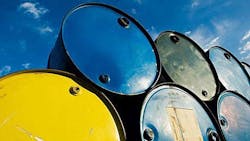Brazil Steps up Bid to Boost Domestic Oil Industry
Brazil on Monday unveiled a package of incentives and subsidies to try to develop the homegrown technology needed to explore the country's huge offshore oil reserves.
The government hopes to tap the so-called "pre-salt" reserves off the southeast Atlantic coast, buried beneath several miles of ocean, bedrock and hot salt beds -- beyond the reach of local technology.
"Very little of the work in the pre-salt is done by Petrobras (IW 1000/19) and our partner companies," Graca Foster, head of the state-owned firm, said at a signing ceremony at her company's headquarters.
Glauco Arbix, the head of a federal agency funding science and technology, said the government wants to encourage local companies to "enter areas where they don't normally go, areas dominated by foreign companies."
He said exploration in the pre-salt reserves offered "an exceptional opportunity to enhance the quality of our engineering" and "can guarantee a leap in our economy."
The National Petroleum Agency estimates that the huge pre-salt reserves, discovered in 2006, could hold more than 100 billion barrels of high-quality recoverable crude and could turn Brazil into one of the world's top exporters.
One of the initiatives announced Monday was the Inova Petro program, which earmarks up to $1.5 billion for innovation in research, development, engineering, technology, production and the marketing of oil-derived products.
This would involve backing high-risk business ventures which Brazil's private sector has been reluctant to undertake, officials said.
With planned investments of $235.5 billion through 2016 for pre-salt exploration, Petrobras hopes to double its production by 2020 and become one of the world's top oil producers.
But since 2003, the oil giant has failed to meet its annual production targets and its projects are running behind schedule.
Foster recently had to revise downward the company's estimated production in 2020 from 4.91 million barrels per day to 4.2 million.
Petrobras had its worst performance in 13 years during the second quarter of this year, with net losses of $663 million, prompting Foster to say the company had to focus on producing more crude and cutting costs.
Copyright Agence France-Presse, 2012
About the Author
Agence France-Presse
Copyright Agence France-Presse, 2002-2025. AFP text, photos, graphics and logos shall not be reproduced, published, broadcast, rewritten for broadcast or publication or redistributed directly or indirectly in any medium. AFP shall not be held liable for any delays, inaccuracies, errors or omissions in any AFP content, or for any actions taken in consequence.
